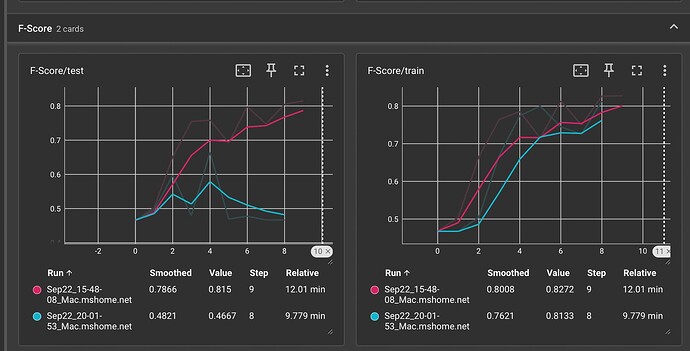I have model that uses LSTM and full connected layer
Model(
(lstm): LSTM(3, 32, num_layers=3, batch_first=True, dropout=0.7)
(dense): Linear(in_features=32, out_features=2, bias=True)
)
I am training and testing my model using MPS on Apple M2 chip
For loss function I am using Cross Entropy Loss with computed weights for each class and for optimisation I am using AdamW, F-Score is measured classification_report from sklearn library
The problem is when batch size of test and train dataset is 64, model performance grows as expected. But when batch size of test dataset is 256, performance will drop massively and not grow any further
On plot below you can see performances of batch sizes. Pink graph represents batch size of test dataset of 64, blue represents batch size of 256
Train F-Score is computed on train dataset with batch size of 64. It faces same issue with different performances dependent on batch size
I am also always set my model to eval() or train() mode
for epoch in range(epochs):
model.train()
print(f'Epoch {epoch}')
__train_loop(model, train_dataloader, loss_function, optimizer, scheduler, verbose, device=device)
model.eval()
train_accuracy, train_f_score = test_model(model, train_dataloader, device=device)
print(f'Train accuracy: {train_accuracy}')
print(f'Train F-Score: {train_f_score}')
accuracy, f_score = test_model(model, test_dataloader, device=device)
training loop:
for batch_id, (X, y) in enumerate(train_dataloader):
X, y = X.to(device), y.to(device)
optimizer.zero_grad()
y_pred = model(X)
loss = loss_function(y_pred, y)
loss.backward()
optimizer.step()
testing model
y_pred_all = []
y_all = []
with torch.no_grad():
for batch_id, (X, y) in enumerate(test_dataloader):
X, y = X.to(device), y.to(device)
y_pred = model(X)
y_pred = torch.argmax(y_pred, dim=1)
y_pred_all.append(y_pred.cpu().numpy())
y_all.append(y.cpu().numpy())
bar.update(batch_id)
y_pred_all = np.hstack(y_pred_all).flatten()
y_all = np.hstack(y_all).flatten()
cr = classification_report(y_all, y_pred_all, output_dict=True)
f_score = cr['macro avg']['f1-score']
accuracy = cr['accuracy']
I expect performance not change drastically when changing batch size of dataset, influence of batch size on model’s output is odd here, because I am not using batch norm. It seems for me that for some reason, LSTM’s output is dependednt on batch size
